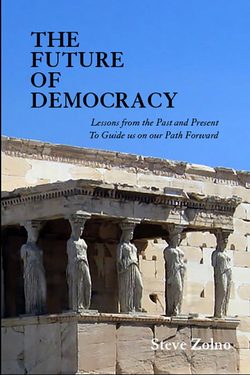Читать книгу THE FUTURE OF DEMOCRACY - Steve Zolno - Страница 11
На сайте Литреса книга снята с продажи.
Rebuilding Trust
ОглавлениеEvery group of individuals, large or small, becomes democratic when we interact respectfully to identify and move toward common goals.4 What we call dialogue often really is disagreement or criticism that pits us against each other. But history shows us that when we use respectful dialogue we are more likely to identify and progress toward what we want to achieve. The reintroduction of respectful, democratic interactions can represent a radical departure from what has gone before. It can mark the beginning of a renewed sense of trust in working together toward a future of shared decision making and accomplishment.
Democracy has the potential to improve our lives by creating a more just world. Many use the term “democracy” to focus on individual preferences and their own needs, rather than on what benefits the whole. Terms such as “liberty” can refer to what works best to preserve individual rights, or on the intent by some to impose their will on others. If only considered to be rule of the majority, democracy has the potential, by those who pervert it, to crush individual liberties. At that point it no longer really is democracy. The direction of true democracy must be played out in respectful interactions by those whose lives are affected, with the interests of all kept in mind.
We only know our own limited concepts of ourselves, others and our world. The world beheld by each of us is different.5 Our words—even when enlarged into phrases and sentences—only reflect a part of what we see and want to express. Communication is difficult, and often the most simplified phrases, although attractive for their brevity, only are limited reflections of the world around us or what we really think or feel. Miscommunication is common. Establishing common goals and reaching agreement on how best to work toward them is a continual challenge. But despite the obstacles inherent in communication, our choice always is whether to work toward greater trust between ourselves and others or to assume that others cannot be trusted.
It ultimately may be true that many people – and nations – are not worthy of our trust. But failing to try communication creates a foregone conclusion that reaching mutual goals is impossible. To create real communication we must be aware of the limitations of our perceptions and of human communication skills. Our judgments always are based on limited evidence and are inevitably incomplete. But understanding this brings greater humility to our interactions. It allows us to step back and consider with others what we might do as equals to mutually bring our world to a better place, rather than simply trying to impose our own views. This is the promise and challenge that real democracy holds.
The size of modern governments would never allow us to return to the “direct democracy” of Athens, where only a small percent of residents were allowed to participate. In our world it always will be a few representatives who determine if we are governed by democratic ideals. Thus it is essential to determine and express our views about whether those who represent us pursue the interests of only a narrow segment of the population or the broader interests of all.
When the interests of only a few are represented, the interests of those at all levels of society are negatively affected. When economies collapse all suffer the effects. Leaders who claim to understand and support democracy must represent the long-term interests of the population as a whole or they fail to represent any of us. We can bring democratic interactions to bear in our institutions, organizations, and personal lives. For society to move toward a more secure future for everyone, we must become better at clarifying those lessons from our past that can shine a light on the path before us.
In the following chapters we will (1) look at the origins of democracy, (2) consider the extent to which democracy – or its denial – affects our current world, and (3) discuss what is needed to maintain the benefits of democracy for our future.
Clarity about democratic ideals and their application to our lives and institutions is essential for those who want to live in a truly civilized world. The following chapters attempt to demonstrate how to create and maintain this clarity in every type of human interaction. As you read through these pages it will become clear how the themes of trust and distrust have shaped us and our cultures from the beginning and how they are likely to continue to shape our future. Practicing democracy may not make it perfect, but it increases our chances of making it possible.
